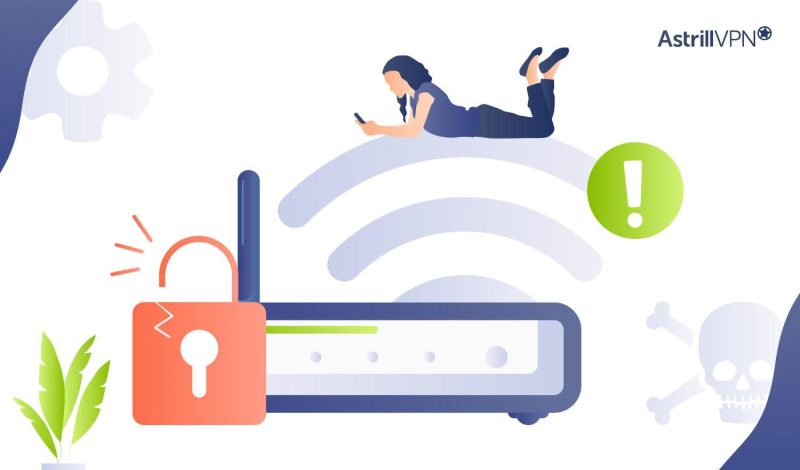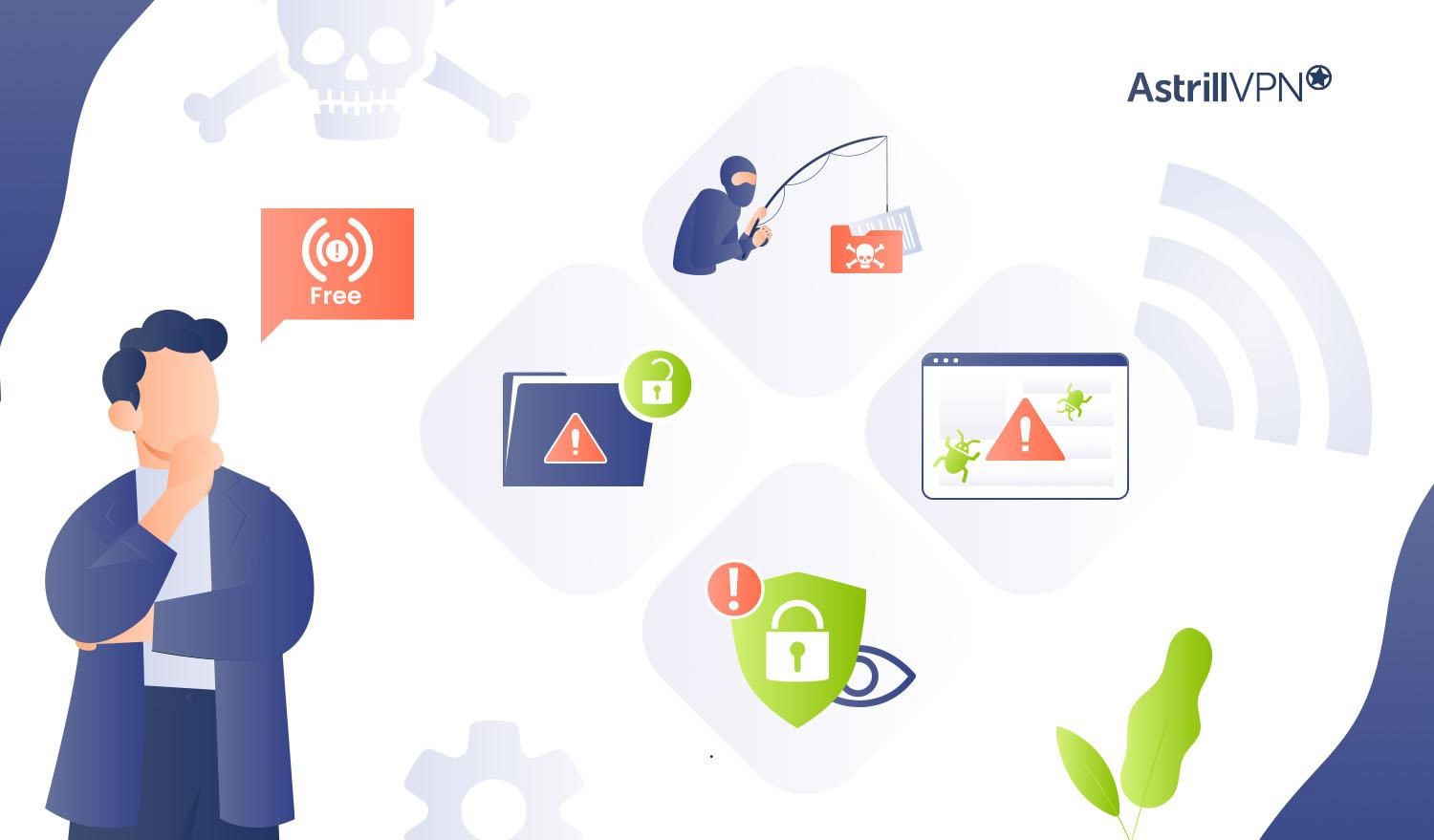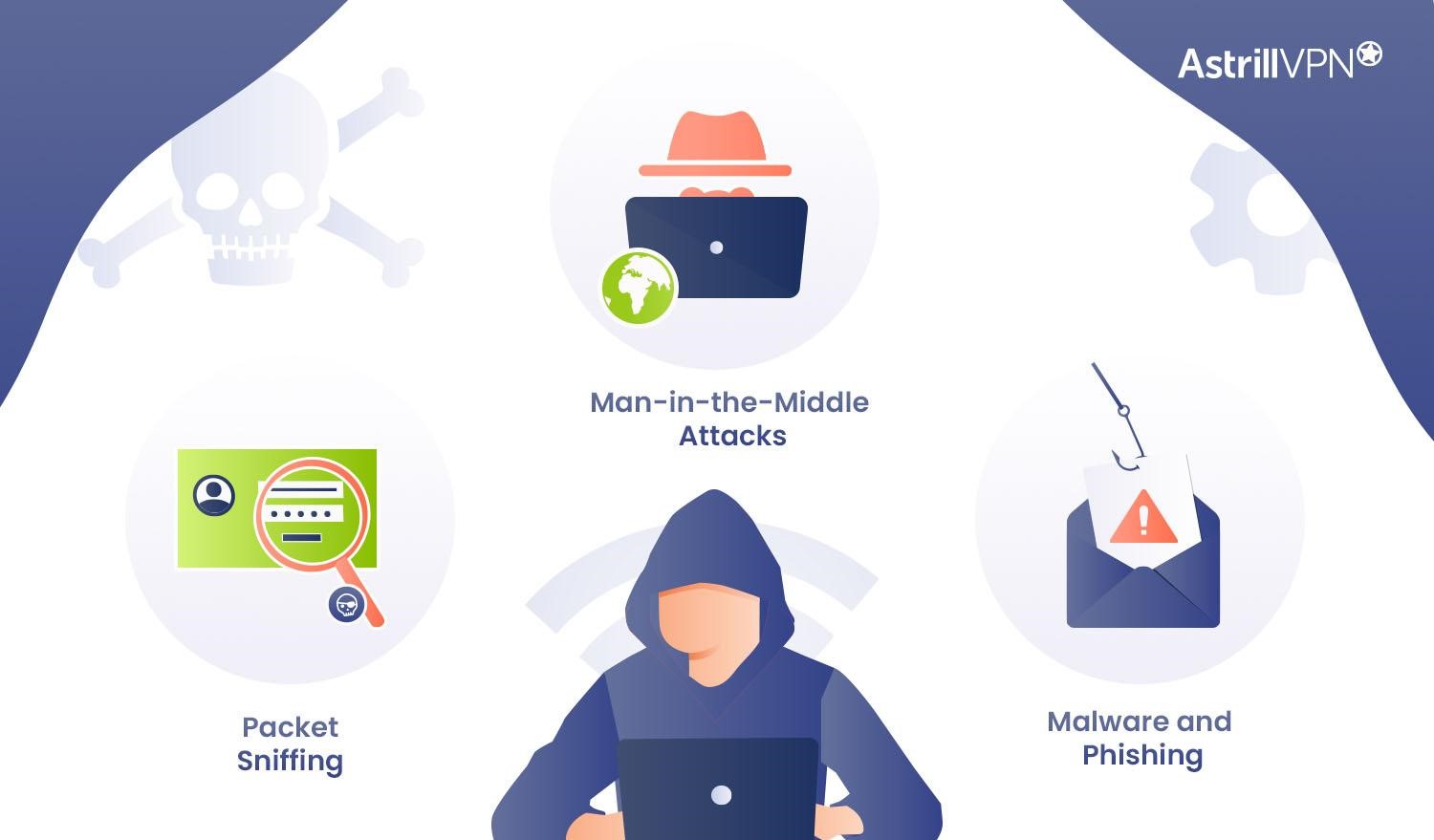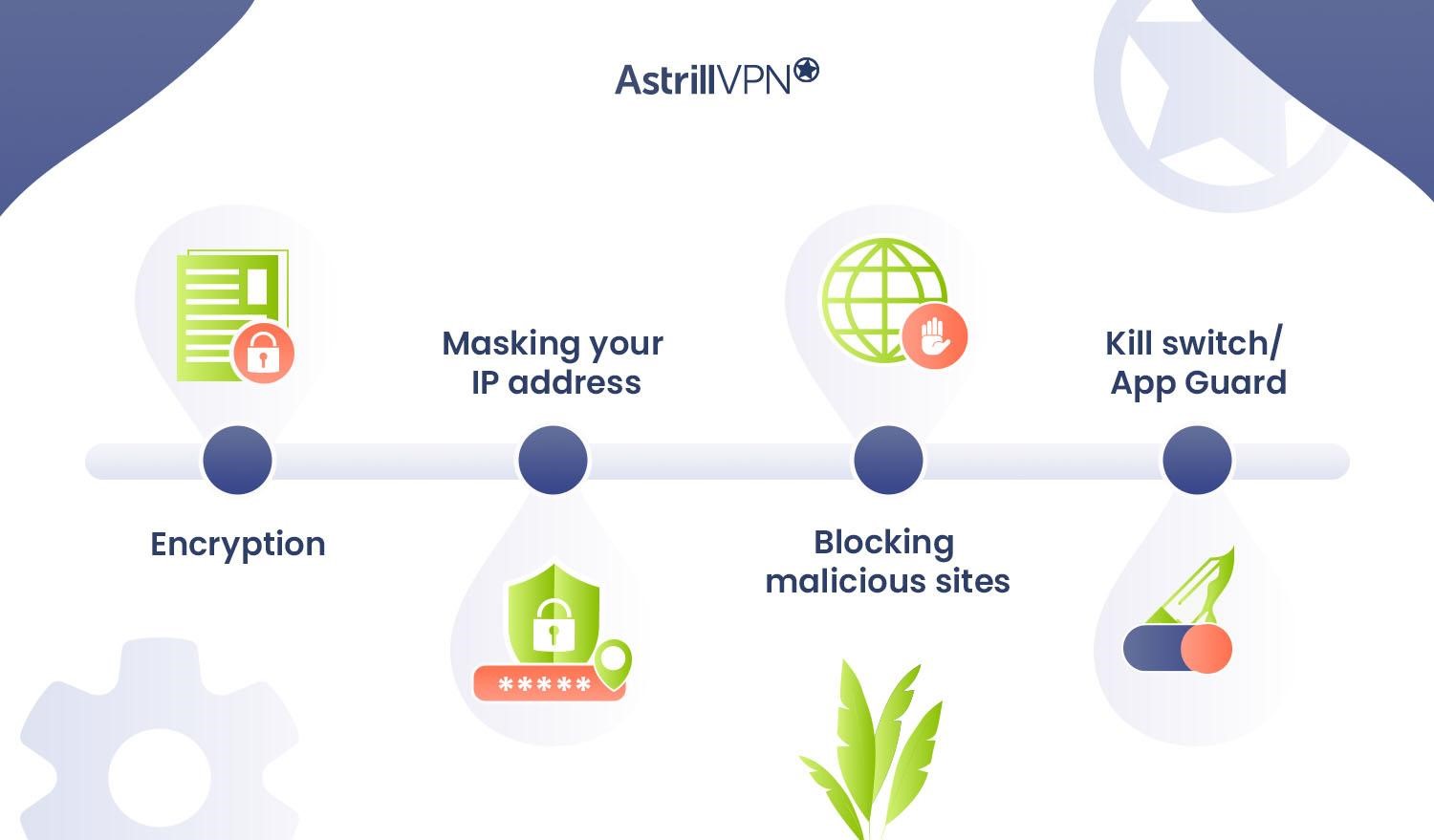What Security Risk does a Public WiFi Connection pose

Bisma Farrukh

Ever find yourself in need of Internet access while out and about, so you hop on the nearest public Wi-Fi network? It’s convenient, but is that free Wi-Fi ever really safe? Think about it – that network is open to anyone nearby, and there are hackers who know how to snoop on what people do on public hotspots. You could be putting your privacy, data, and devices at risk by connecting without protection.
There are some easy ways you can use that public Wi-Fi safely and securely. We’ll show you the risks you need to be aware of and the tools and techniques you can use to protect yourself. Follow our advice and you can surf smart, keep your digital life locked up tight, and thwart the hackers and snoops trying to worm their way in through that tempting open network.
Table of Contents
Why public wifi is unsafe?
- Public wifi networks are unencrypted, meaning anyone can see what websites you visit and capture your login info or personal details. Hackers set up fake networks with similar names to popular wifi spots to trick you into connecting.
- Once connected to a public wifi, hackers can access everything you do on that network. They can install malware to steal passwords, credit card numbers, or your identity.
- Public wifi providers can also see your activity and may collect and sell your data. Your browsing history, messages, and more can be gathered for targeted ads.
The Dangers of Public Wi-Fi

Using public Wi-Fi networks can be risky business. Here are a few dangers to keep in mind:
Your Data Isn’t Secure
Public Wi-Fi networks aren’t encrypted, meaning your online activity and personal information like passwords are visible to anyone else on the network. Hackers can easily snoop on what you do and steal your data.
Hackers Can Access Your Accounts
On an open network, it’s easy for cybercriminals to see the sites you access and capture your account info or passwords. They may gain access to your social media, email, bank accounts and more.
Malware Infections Are Common
It’s common for hackers to set up malicious hotspots to spread malware, viruses, and other threats. Connecting to one of these nefarious networks could infect your laptop or mobile device.
Your Privacy Is at Risk
Using public wireless connections means anyone can potentially see everything you do online. Your messages, browsing history, credit card numbers – it’s all out in the open. For privacy and security, it’s best to avoid using public Wi-Fi altogether when possible.
What Security risks does a public Wi-Fi connection pose?
Public Wi-Fi networks are convenient, but they pose some serious security risks you should be aware of.
Snooping and hacking
On public Wi-Fi, your online activity and personal information are out in the open. Hackers can snoop on what websites you visit and see what you input into forms. They may also be able to access accounts by stealing your passwords. It’s best to avoid logging into accounts with sensitive info like banking on public networks.
Viruses and malware
Public hotspots are a prime target for cybercriminals to spread malware, viruses, and other digital threats. They can infiltrate the network and infect your device when you connect. Be very cautious about clicking links, downloading software, or running executable files on public Wi-Fi.
Bandwidth theft
Some hackers tap into public Wi-Fi to steal bandwidth for their own use. This can slow down your connection speed and access. There’s not much you can do to prevent this, but at least be aware it may impact your Wi-Fi performance.
How Hackers Can Exploit Public Wi-Fi?

Public Wi-Fi networks are convenient, but they come with risks. Hackers can exploit unsecured networks to access your personal information. Here are some of the ways they can compromise your data:
Packet Sniffing
On public networks, hackers can use packet sniffing tools to monitor data transmitted between your device and the network. They capture usernames, passwords, credit card numbers – anything you enter or access.
Man-in-the-Middle Attacks
Hackers can position themselves between your device and the network, monitoring and modifying data as it travels back and forth. They can redirect you to fake websites to steal data or install malware.
Malware and Phishing
Hackers often use public Wi-Fi to spread malware and launch phishing campaigns. Malware can infect your device, allowing hackers access to your files, photos, and accounts. Phishing emails try to trick you into clicking links, downloading attachments, or entering sensitive data.
Public Wi-Fi will likely never be 100% safe, but by taking some basic precautions, you can reduce risks and protect your data. When in doubt, consider using your phone as a mobile hotspot instead.
The Real Risks Of Public Wi-Fi: Key Statistics And Usage Data
The risks of using public Wi-Fi are real. According to recent studies, over half of public Wi-Fi hotspots have security vulnerabilities that can expose your personal data.
Key Stats
- A 2020 study found that 56% of public Wi-Fi networks tested had security flaws that could allow hackers to see users’ online activity and steal personal information like passwords or credit card numbers.
- Public Wi-Fi is a hacker’s paradise. It’s estimated that over 68% of hackers target public Wi-Fi networks to carry out cybercrimes.
- On average, a public Wi-Fi user’s personal information and accounts can sell for over $50 each on the dark web. With over a billion public Wi-Fi users worldwide, that’s a huge market.
The risks may be scary, but with some caution, you can still use public Wi-Fi safely. Take some basic security steps, and you’ll be able to surf securely wherever you go.
Best Practices for Safe Public Wi-Fi Use
The open nature of public Wi-Fi makes your online activity vulnerable. Here are some best practices to keep your information secure:
Use a VPN
A virtual private network (VPN) encrypts all your internet traffic and hides your online activities. Enable AstrillVPN on your device before connecting to public Wi-Fi. Free or low-cost VPN options can not provide adequate security so use paid VPN service instead.
Avoid sensitive activities
Don’t conduct sensitive activities like online banking, shopping, or bill paying on public Wi-Fi. Others can see your passwords and account information. Wait until you’re on a secure network.
Double your login protection
Enable two-factor authentication on all accounts whenever possible. This adds an extra layer of security for your logins by requiring not just your password but also a code sent to your phone or an authentication app.
Change your passwords
Use long, complex, unique passwords for all your accounts. After connecting to public Wi-Fi, change your passwords again as a precaution. Even with a VPN, there is a small chance your information could still be compromised.
Turn off Wi-Fi and Bluetooth when idle
Disable Wi-Fi and Bluetooth on your devices when not in use. This prevents them from connecting automatically to new networks and devices without your knowledge. Only turn them on when you need to access a network or connect a device.
Be alert for signs of hacking
Watch for signs your accounts or devices may have been hacked like unknown charges, messages you didn’t send, or new apps you didn’t download. The sooner you take action, the less damage can be done. Monitor accounts and change passwords immediately if you suspect hacking.
How AstrillVPN can mitigate the Security Risks Posed by a Public WiFi Connection?

AstrillVPN can help mitigate the security risks of using public WiFi in several ways:
Encryption
AstrillVPN encrypts all of your internet traffic and hides your online activities. This prevents anyone from seeing what websites you visit or stealing your passwords and credit card numbers.
Masking your IP address
AstrillVPN masks your real IP address and replaces it with an anonymous one from their server. This hides your true location and identity, preventing targeted attacks.
Blocking malicious sites
AstrillVPN blocks connections to known phishing websites, malware hosts, and other malicious destinations. This adds an extra layer of protection for your devices and accounts.
Kill switch/ App Guard
If the AstrillVPN connection drops for any reason, their “kill switch/ App guard” feature cuts off your internet access altogether. This prevents your unencrypted data from leaking onto the public network.
Using a reputable VPN service like AstrillVPN when connecting to public WiFi helps safeguard your privacy and security. Their robust encryption, IP masking, malware blocking, and kill switch protect you from the dangers lurking on unsecured networks. With AstrillVPN enabled, you can use public hotspots with confidence knowing your online activities and accounts are shielded from prying eyes.
Alternatives for secure Public Wi-Fi Connections
Public Wi-Fi networks are notorious for security risks, but that doesn’t mean you have to avoid them altogether. When using public hotspots, be extremely cautious and consider enabling extra protections. Some safer alternatives for connecting on the go include:
Mobile Hotspots
If you have a smartphone, you can turn it into a personalized Wi-Fi hotspot to securely connect your other devices. Set a strong password on your hotspot to prevent others from accessing it.
VPN Services
A virtual private network or VPN encrypts all the data you send and receive on public networks. VPNs establish an encrypted tunnel between your device and a VPN server, hiding your online activity and location.
Encrypted Messaging Apps
For basic web browsing, public Wi-Fi should be ok. But never use unsecured networks for activities like online banking, shopping or sending private messages. Apps like Signal, WhatsApp and Wire offer end-to-end encryption to keep your chats, calls and files private.
USB modems
If you frequently need a fast, dependable connection on the go, consider using a USB modem or portable Wi-Fi hotspot from a mobile network carrier. These provide access to secure 4G LTE networks and don’t require a smartphone to function as a hotspot. Prices vary but typically start around $10/month.
Using common sense precautions, you can enjoy the convenience of public Wi-Fi with less risk.
FAQs
A lot of people wonder if public Wi-Fi networks are safe to use for casual internet browsing or accessing accounts. The short answer is: not really. Public networks are convenient, but they do pose some risks.
No, unsecured Wi-Fi networks are not safe. Without a password, anyone within range can see what you’re doing on the network. They could access account information you enter, download malware onto your device, or capture personal details. It’s best to avoid using Wi-Fi networks that don’t require a password.
It’s risky to sign in to accounts on public Wi-Fi. Someone could potentially see your username, password, and any information transmitted or received. If you must use public Wi-Fi, enable two-factor authentication on accounts whenever possible and be cautious about what information you access or enter.
HTTPS does encrypt information transmitted between your device and websites, but it does not secure the Wi-Fi network itself. While HTTPS prevents others from seeing what’s on the pages you access, someone could still potentially capture your account info or install malware. So, HTTPS helps but does not make public Wi-Fi networks completely safe.
Conclusion
While public Wi-Fi can be tempting and convenient, you now know the risks involved with logging on to an unsecured network. Take the precautions outlined here to safeguard your personal information and think twice before entering any passwords or credit card numbers. Your data and identity are too valuable to put at risk for the sake of a free Internet connection. Be smart and take care of yourself. If anything still makes you feel uneasy, don’t hesitate to abstain. Your online security is worth far more than any momentary inconvenience.

No comments were posted yet